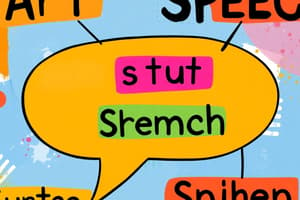Podcast
Questions and Answers
Which of the following are considered open classes in parts of speech?
Which of the following are considered open classes in parts of speech?
- Prepositions
- Nouns (correct)
- Pronouns
- Adjectives (correct)
Closed classes can have an unlimited number of new words invented.
Closed classes can have an unlimited number of new words invented.
False (B)
What part of speech is the word 'fast' in the sentence 'He accepted the deal too fast'?
What part of speech is the word 'fast' in the sentence 'He accepted the deal too fast'?
adverb
The word 'round' can function as a ______ when referring to a shape.
The word 'round' can function as a ______ when referring to a shape.
Match the following new words to their components:
Match the following new words to their components:
Which of the following is a function word?
Which of the following is a function word?
The nature of a word can change depending on its context.
The nature of a word can change depending on its context.
What is the purpose of determiners in a sentence?
What is the purpose of determiners in a sentence?
A clause always includes a _____ and consists of one or more phrases.
A clause always includes a _____ and consists of one or more phrases.
Match the following parts of speech with their descriptions:
Match the following parts of speech with their descriptions:
Which of the following is NOT a category of part of speech?
Which of the following is NOT a category of part of speech?
Adverbs can only modify verbs.
Adverbs can only modify verbs.
What are auxiliaries used for in a sentence?
What are auxiliaries used for in a sentence?
Which of the following verbs is used in the first sentence?
Which of the following verbs is used in the first sentence?
Both sentences contain only one independent clause.
Both sentences contain only one independent clause.
Identify a noun phrase (NP) from the second sentence.
Identify a noun phrase (NP) from the second sentence.
The first sentence describes a white man with a _____ in his possession.
The first sentence describes a white man with a _____ in his possession.
Match the following verbs with their sentences:
Match the following verbs with their sentences:
Flashcards
Open classes of words
Open classes of words
Word classes that can constantly be added to with new words.
Closed classes of words
Closed classes of words
Word classes with a fixed number of members that don't change.
Words with multiple parts of speech
Words with multiple parts of speech
Words that can belong to different parts of speech depending on context.
Neologisms
Neologisms
Signup and view all the flashcards
Word formation
Word formation
Signup and view all the flashcards
Clause
Clause
Signup and view all the flashcards
Noun Phrase (NP)
Noun Phrase (NP)
Signup and view all the flashcards
Verb Phrase (VP)
Verb Phrase (VP)
Signup and view all the flashcards
Prepositional Phrase (PP)
Prepositional Phrase (PP)
Signup and view all the flashcards
Morpheme
Morpheme
Signup and view all the flashcards
Lexical Words
Lexical Words
Signup and view all the flashcards
Function Words
Function Words
Signup and view all the flashcards
Determiners
Determiners
Signup and view all the flashcards
Prepositions
Prepositions
Signup and view all the flashcards
Conjunctions
Conjunctions
Signup and view all the flashcards
Study Notes
Session 3: Parts of Speech
- Language is a code used for interaction
- Direct speech varies depending on the context (register)
- English sentence structure is generally understood
- Parts of speech are categorized into two types:
- Lexical Words (meaning/concept): Examples include "bird," "eat"
- Function Words (form/relationship between words): Examples include "but," "is"
- Word nature stays consistent ("cat ate mouse" vs "mouse is grey")
Parts of a Noun Phrase
- Determiners: introduce a noun (e.g., "the," "a")
- Adjectives: describe nouns (e.g., "grey" describing a noun)
- Nouns: refer to things, people, ideas
- Adverbs: modify verbs, adjectives, or other adverbs
- Verbs: actions or states
- Complements of Direct Object (CD): objects affected by a verb's action
- Subjects: perform the action of a verb
- Prepositions: relate a noun phrase to another (e.g. "with")
- Pronouns: replace nouns or noun phrases
- Conjunctions: connect words, phrases, or clauses
Activity 1: Recognizing Parts of Speech
- Lexical words can be nouns, verbs, adjectives, or adverbs
- Nouns refer to objects or people
- Verbs describe actions or states
- Adjectives describe the quality of a noun
- Adverbs modify verbs, adjectives, or other adverbs
Grammatical Units
- A clause includes one or more phrases
- A phrase includes one or more words or morphemes
Function Words
- Determiners specify the noun they modify
- Prepositions link noun phrases together
- Conjunctions connect words, phrases, or clauses
- Auxiliary verbs accompany main verbs (e.g., "is," "has")
Open and Closed Classes
- Open classes: nouns, verbs, adjectives, and adverbs have many members and new ones can be created
- Closed classes: determiners, prepositions, conjunctions, and pronouns have a fixed number of members
Studying That Suits You
Use AI to generate personalized quizzes and flashcards to suit your learning preferences.




